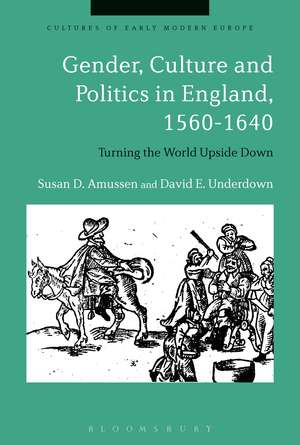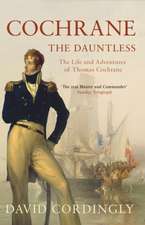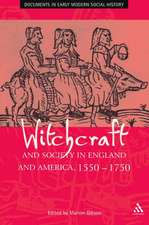Gender, Culture and Politics in England, 1560-1640: Turning the World Upside Down: Cultures of Early Modern Europe
Autor Professor Susan D. Amussen, Late Professor David E. Underdown Beat Kümin, Professor Brian Cowanen Limba Engleză Hardback – 5 apr 2017
| Toate formatele și edițiile | Preț | Express |
|---|---|---|
| Paperback (1) | 237.37 lei 6-8 săpt. | |
| Bloomsbury Publishing – 31 oct 2018 | 237.37 lei 6-8 săpt. | |
| Hardback (1) | 773.71 lei 3-5 săpt. | |
| Bloomsbury Publishing – 5 apr 2017 | 773.71 lei 3-5 săpt. |
Preț: 773.71 lei
Preț vechi: 1112.86 lei
-30% Nou
Puncte Express: 1161
Preț estimativ în valută:
148.14€ • 154.26$ • 122.91£
148.14€ • 154.26$ • 122.91£
Carte disponibilă
Livrare economică 23 ianuarie-06 februarie
Preluare comenzi: 021 569.72.76
Specificații
ISBN-13: 9781350020672
ISBN-10: 1350020672
Pagini: 248
Ilustrații: 8 bw illus
Dimensiuni: 156 x 234 x 18 mm
Greutate: 0.52 kg
Editura: Bloomsbury Publishing
Colecția Bloomsbury Academic
Seria Cultures of Early Modern Europe
Locul publicării:London, United Kingdom
ISBN-10: 1350020672
Pagini: 248
Ilustrații: 8 bw illus
Dimensiuni: 156 x 234 x 18 mm
Greutate: 0.52 kg
Editura: Bloomsbury Publishing
Colecția Bloomsbury Academic
Seria Cultures of Early Modern Europe
Locul publicării:London, United Kingdom
Caracteristici
Brings together the work of two eminent historians from the fields of early modern English history and gender history
Notă biografică
Susan D. Amussen is Professor of History at the University of California, Merced, USA. She is the author of Caribbean Exchanges: Slavery and the Transformation of English Society, 1640-1700 (2007) and An Ordered Society: Gender and Class in Early Modern England (1988). She is also the editor of Attending to Early Modern Women (1998; with Adele Seeff) and Political Culture and Cultural Politics in Early Modern England (1995; with Mark A. Kishlansky). The late David E. Underdown was George Burton Adams Professor of History at Yale University, USA. He is the author of A Freeborn People: Politics and the Nation in Seventeenth-Century England (1996), Fire from Heaven: Life in an English Town in the Seventeenth Century (1992), Revel, Riot and Rebellion: Popular Politics and Culture in England, 1603-1660 (1985) and Prides Purge: Politics in the Puritan Revolution (1971).
Cuprins
List of IllustrationsPreface and AcknowledgementsList of AbbreviationsIntroduction1. Unruly Women 2. Failed Patriarchs 3. Performing Inversion: Theatre, Politics, and Society 4. Performing Inversion in Civic Pageantry and Charivari 5. Witches, Magicians, and the Upside-Down World ConclusionBibliographyIndex
Recenzii
An invaluable synthesis of scholarly material for undergraduates studying early modern gender, literature and social history ... The writing is accessible and elegant ... The authors' conceptual framework of 'inversion' and emphasis on the importance of reciprocity in gender relations are stimulating contributions to the historiography.
No-one is better placed to forensically examine the powerful idea of the world turned upside-down, and the unruly women and incompetent men that peopled popular fantasy. In this far-reaching exploration of families, rituals, politics and drama, we begin to understand how fragile order could seem in the early modern world, and why ordinary people as well as monarchs were so preoccupied with testing its limits. An outstanding and necessary piece of social and cultural history.
Tracing gender's power in domesticity, drama and civic life, Susan Amussen and David Underdown provide an object lesson in the benefits of writing across the artificial separations of political, social and cultural history. A must-read for everyone eager to understand the inner worlds of early modern peoples.
The book is the product of the enduring partnership between two major historians of early modern England, first planned by David Underdown, and brought to triumphant fruition by Susan Amussen. Linking the politics of the royal court to intimate local conflicts and to stories told on the stage, the book offers a capacious account of the cultural, social and political history of early modern England, an account to which gender is central.
Gender, Culture and Politics is a remarkable achievement, representing the culmination of a lifetime's reading and thinking by one of the foremost social historians of his generation. Susan Amussen has done a quite brilliant job of bringing to the press a volume that might, given the tragic circumstances of its composition, have been lost to posterity. The book is a wonderful summation of David Underdown's scholarship: conceptually sophisticated, empirically rigorous and mellifluously written. It will be required reading for all students of society, culture and politics in early modern England.
No-one is better placed to forensically examine the powerful idea of the world turned upside-down, and the unruly women and incompetent men that peopled popular fantasy. In this far-reaching exploration of families, rituals, politics and drama, we begin to understand how fragile order could seem in the early modern world, and why ordinary people as well as monarchs were so preoccupied with testing its limits. An outstanding and necessary piece of social and cultural history.
Tracing gender's power in domesticity, drama and civic life, Susan Amussen and David Underdown provide an object lesson in the benefits of writing across the artificial separations of political, social and cultural history. A must-read for everyone eager to understand the inner worlds of early modern peoples.
The book is the product of the enduring partnership between two major historians of early modern England, first planned by David Underdown, and brought to triumphant fruition by Susan Amussen. Linking the politics of the royal court to intimate local conflicts and to stories told on the stage, the book offers a capacious account of the cultural, social and political history of early modern England, an account to which gender is central.
Gender, Culture and Politics is a remarkable achievement, representing the culmination of a lifetime's reading and thinking by one of the foremost social historians of his generation. Susan Amussen has done a quite brilliant job of bringing to the press a volume that might, given the tragic circumstances of its composition, have been lost to posterity. The book is a wonderful summation of David Underdown's scholarship: conceptually sophisticated, empirically rigorous and mellifluously written. It will be required reading for all students of society, culture and politics in early modern England.























